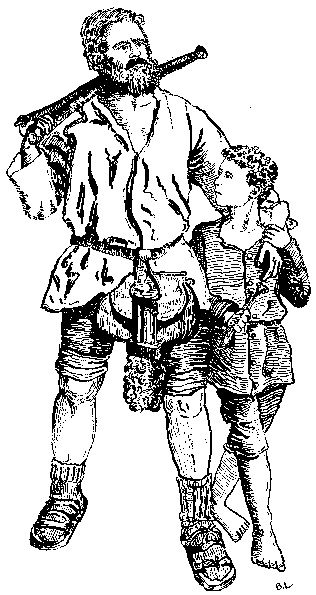
REAL HISTORY
William Tell
|
|
About seven hundred years ago the little country of Switzerland was governed by a man called Hermann Gessler. He was in the service of the Austrian Emperor, and his harsh ways had made him very unpopular.
One day a man called Wilhelm (William) Tell walked into the
village of Altdorf, his little son by his side. He came from the nearby hamlet
of Bürglen, and was reputed to be the best crossbowman and the best handler of
a boat in the region. He was talking to his son and did not see a hat set atop a
long pole that stood in the marketplace. Suddenly two soldiers laid hold of him,
and asked him how he dared walk by the Governor’s hat without bowing down.
“What do you mean? Why should I bow to an empty hat?” said Wilhelm
Tell.
“It is Gessler’s orders. Whoever passes by must show their loyalty to
Austria, and bow to his hat. Those who disobey will be executed.”
A crowd had gathered about the little group, and a low murmur now went up
as a party of men on horseback clattered into the marketplace – the Governor
himself had arrived.
“What is happening here?” said Gessler. “Why have you arrested this
man?”
“He refuses to pay homage to your hat, my lord,” said the soldiers.
“It is Wilhelm Tell, the crossbowman from Bürglen.”
“Ah, I have heard of your skill with the crossbow,” said Gessler. “Now,
let us see if the tales are true. Take that boy and tie him to yonder linden
tree.”
Wilhelm Tell watched in horror as his son was dragged from him, and bound
to the trunk of the tree.
“Now set this apple on his head,” said Gessler. “Tell, if you can
split that apple with your arrow I will spare your life.”
When Wilhelm Tell heard these words he went pale.
“I cannot do that, your grace,” he said. “What if I miss? I cannot
aim at my own child.”
“Then he shall be killed in your sight,” said Gessler. “Come, I
wish to see a display of your skill.”
Slowly Wilhelm Tell drew two arrows from his quiver, and set one in his
belt. The second he fitted to his bow, and set it upon his shoulder. A moment
later a loud cheer arose among the bystanders; the apple had been pierced
through the centre, and fell in two equal pieces.
“A mighty shot!” said Gessler. “But tell me – why did you take
two arrows?”
“If the first arrow had hurt my child I would have killed you with the
second,” said Tell.
The Governor’s face darkened with anger.
“Indeed? So long as you are at liberty I am at risk. I will spare your
life, but you shall spend what is left of it in the prison across the lake.
Guards, seize him!”
To the crowd’s dismay the soldiers once again laid hold of Tell, and
hustled him down to a boat that was moored on the lake.
With Gessler on board, they cast off and set sail for the fortress in
which Tell was to be imprisoned. Soon, however, a terrible storm arose, and the
Governor and his men began to lose hope of ever reaching the opposite shore
alive.
“Your honour,” said one of the soldiers. “This Tell is the best
helmsman in Switzerland. Let us release him and give him control of the boat –
otherwise we will all be drowned!”
Wilhelm Tell agreed to guide them to safety, and, taking the rudder,
directed the vessel towards a large, overhanging rock. Suddenly he made a spring
upwards, and caught hold of the rock. Before Gessler could recover his wits Tell
had pulled himself up and disappeared.
“Cast anchor, cast anchor!” cried Gessler. “We cannot let him
escape!”
The Governor and his men disembarked, and set off along the narrow gully
between Kussnacht and Immensee.
“I shall destroy this Tell,” muttered Gessler as he rode along. “I
will kill him, and his wife, and his children…”
Before he could go any further an arrow whizzed through the air and
entered his heart. The Governor fell back, deprived of life, and a figure with a
crossbow appeared for a moment against the sky.
Wilhelm Tell had freed the people of Switzerland from their oppressor,
and they hailed him as a hero. Some even wanted to make him king, but he
refused, and returned to his peaceful cottage in the mountains.